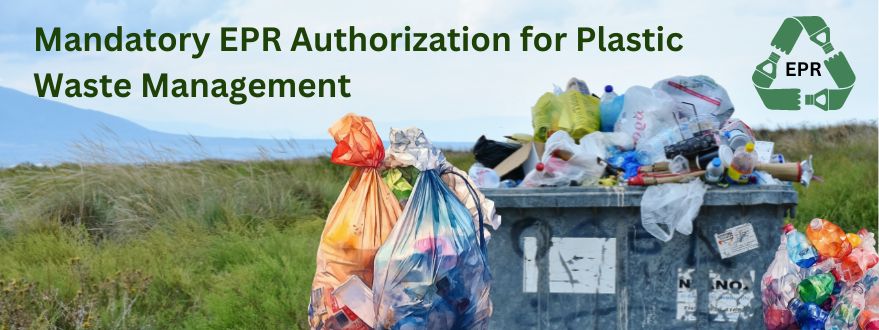
Plastic pollution is a pressing environmental issue worldwide, and India is grappling with its significant impact on the environment and public health. With a burgeoning population and rapid urbanization, the country generates a substantial amount of plastic waste, posing challenges for waste management systems.
In response to this growing concern, India has taken proactive measures to address plastic waste through policies like Extended Producer Responsibility (EPR) Authorization. EPR Authorization for plastic waste management has become a pivotal initiative in addressing the environmental impacts of plastic pollution.
This blog delves into the significance of EPR Authorization for P-waste management in India.
Extended Producer Responsibility is a policy approach where producers, importers, and brand owners are held responsible for the entire life cycle of their products, including post-consumer disposal.
EPR Authorization is a legal mechanism that mandates producers to manage the end-of-life disposal of their products in an environmentally sustainable manner.
This authorization aims to shift the burden of managing various waste from local governments and municipalities to the producers and brand owners.
Extended Producer Responsibility (EPR) Authorization for plastic waste is a regulatory system in India that places the onus on manufacturers, importers, and brand owners to manage the entire lifecycle of their packaging materials.
Implemented by the Central Pollution Control Board (CPCB), this framework shifts the responsibility of packaging waste management from consumers and local authorities to these entities.
Under this system, producers are mandated to establish and finance systems for the collection, recycling, and disposal of their packaging materials, promoting waste reduction and encouraging sustainable practices in packaging design and material choices.
The primary goal of EPR Authorization for P-waste Management in India is to foster a more environmentally responsible approach to packaging, aligning with the country's broader efforts towards sustainable development and environmental conservation.
This policy targets to create a more environmentally responsible approach to packaging in India, aligning with the Plastic Waste Management (PWM) Rules introduced by the Ministry of Environment, Forest and Climate Change (MoEFCC) to address the challenges of plastic pollution.
The Plastic Waste Amendment Rules 2022, introduced by the Ministry of Environment, Forestry and Climate Change (MoEF&CC), delineate the framework for managing plastic waste in India.
Under these rules, the Central Pollution Control Board is entrusted with the responsibility of awarding EPR Authorizations to producers, importers, brand owners (PIBO), and plastic waste processors for various activities such as recycling, waste to energy, waste to oil, and industrial composting.
To incentivize the reuse, recycling, and responsible disposal of plastic, compliance with EPR Certificate is mandatory for all organizations involved in the production of pre- and post-consumer plastic packaging waste. Registration with both the CPCB and State Pollution Control Boards (SPCB) is imperative, with PIBOs operating across multiple states or Union Territories required to register with the CPCB.
Before commencing manufacturing activities, obtaining an EPR Registration for plastic waste management is obligatory. As per the latest stipulations outlined in the Plastic Waste Management (PWM) (Amendment) Rules 2022, PIBOs are obligated to submit Form I along with an Action Plan compliant with the Environmental Protection Act, 1986, and fulfill all prescribed prerequisites.
EPR Registration for P-waste is a mandatory requirement for PIBOs in India. This registration is pivotal in ensuring responsible management of plastic waste throughout its lifecycle. Its important role lies in:
There are four categories of plastic packaging covered under EPR:
Category I - Rigid Plastic Packaging
Rigid plastic packaging includes containers, bottles, jars, and other packaging materials made of hard and inflexible plastics. These are commonly used for packaging products such as beverages, cosmetics, and household items.
Examples: PET bottles, HDPE containers, PVC clamshell packaging.
Category II - Flexible Plastic Packaging
Flexible plastic packaging include single-layer or multilayer packaging, including plastic sheets, covers, carry bags, sachets, and pouches. These materials are widely used for packaging food products, snacks, personal care items, and various consumer goods.
Examples: Polyethylene (PE) bags, polypropylene (PP) pouches, laminated plastic films.
Category III - Multilayered Plastic Packaging
Multilayered plastic packaging consists of at least one layer of plastic and one layer of material other than plastic. These packaging materials are used extensively in the food and beverage industry to provide barrier properties and extend shelf life.
Examples: Tetra Pak cartons, laminated foil pouches, composite flexible packaging.
Category IV - Compostable Plastic Packaging
Compostable plastic packaging includes plastic sheets and carry bags made of compostable plastics, which are designed to biodegrade under specific conditions. Compostable plastics offer an alternative to conventional plastics and are aimed at reducing environmental impact.
Examples: Biodegradable shopping bags, compostable food packaging, plant-based plastic films.
The following entities are eligible to apply:
Under EPR Authorization for P-waste, PIBOs using plastic packaging have specific responsibilities, including:
Obtaining the EPR Certificate for P-waste involves several steps, such as:
To obtain EPR Authorization for P-waste management, these documents are required:
At Brand Liaison, we recognize the importance of facilitating the EPR Certification process for producers and importers, enabling them to fulfill their obligations efficiently and effectively. By streamlining the application process and assisting producers in obtaining EPR Certificate quickly and easily, we play a crucial role in promoting environmental stewardship and regulatory compliance.
Our services aim to expedite the adoption of responsible waste management practices, contributing to the conservation of resources, reduction of pollution, and protection of public health.
Contact us now to work towards a cleaner, greener future for India, where P-waste is managed responsibly, and the principles of sustainable development are upheld.